Related Research Articles
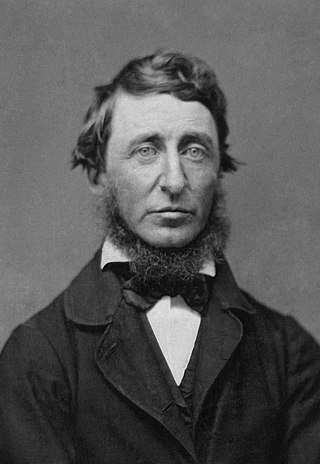
Henry David Thoreau was an American naturalist, essayist, poet, and philosopher. A leading transcendentalist, he is best known for his book Walden, a reflection upon simple living in natural surroundings, and his essay "Civil Disobedience", an argument in favor of citizen disobedience against an unjust state.
Transcendentalism is a philosophical, spiritual, and literary movement that developed in the late 1820s and 1830s in the New England region of the United States. A core belief is in the inherent goodness of people and nature, and while society and its institutions have corrupted the purity of the individual, people are at their best when truly "self-reliant" and independent. Transcendentalists saw divine experience inherent in the everyday. Transcendentalists saw physical and spiritual phenomena as part of dynamic processes rather than discrete entities.

Walden is an 1854 book by American transcendentalist writer Henry David Thoreau. The text is a reflection upon the author's simple living in natural surroundings. The work is part personal declaration of independence, social experiment, voyage of spiritual discovery, satire, and—to some degree—a manual for self-reliance.

John Richard Jefferies was an English nature writer, noted for his depiction of English rural life in essays, books of natural history, and novels. His childhood on a small Wiltshire farm had a great influence on him and provides the background to all his major works of fiction.

Henry Shakespear Stephens Salt was a British writer and campaigner for social reform in the fields of prisons, schools, economic institutions, and the treatment of animals. He was a noted ethical vegetarian, anti-vivisectionist, socialist, and pacifist, and was well known as a literary critic, biographer, classical scholar and naturalist. It was Salt who first introduced Mohandas Gandhi to the influential works of Henry David Thoreau, and influenced Gandhi's study of vegetarianism. Salt is considered, by some, to be the "father of animal rights", having been one of the first writers to argue explicitly in favour of animal rights, rather than just improvements to animal welfare, in his book Animals' Rights: Considered in Relation to Social Progress (1892).

Jenny Julia Eleanor Marx, sometimes called Eleanor Aveling and known to her family as Tussy, was the English-born youngest daughter of Karl Marx. She was herself a socialist activist who sometimes worked as a literary translator. In March 1898, after discovering that her partner Edward Aveling had secretly married the previous year, she poisoned herself at the age of 43.
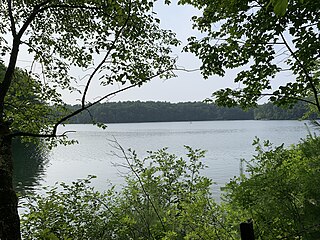
Walden Pond is a celebrated pond in Concord, Massachusetts, in the United States. A good example of a kettle hole, it was formed by retreating glaciers 10,000–12,000 years ago. The pond is protected as part of Walden Pond State Reservation, a 335-acre (136 ha) state park and recreation site managed by the Massachusetts Department of Conservation and Recreation. The reservation was designated a National Historic Landmark in 1962 for its association with the writer Henry David Thoreau (1817–1862), whose two years living in a cabin on its shore provided the foundation for his famous 1854 work, Walden; or, Life in the Woods. The National Historic Preservation Act of 1966 ensured federal support for the preservation of the pond.

Stanley Louis Cavell was an American philosopher. He was the Walter M. Cabot Professor of Aesthetics and the General Theory of Value at Harvard University. He worked in the fields of ethics, aesthetics, and ordinary language philosophy. As an interpreter, he produced influential works on Wittgenstein, Austin, Emerson, Thoreau, and Heidegger. His work is characterized by its conversational tone and frequent literary references.
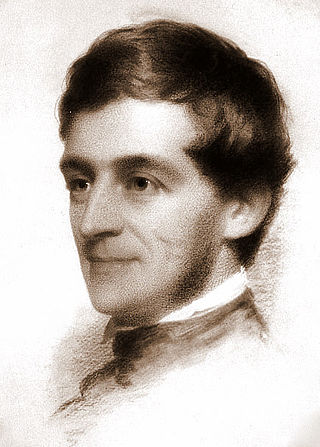
Nature is a book-length essay written by Ralph Waldo Emerson, published by James Munroe and Company in 1836. In the essay Emerson put forth the foundation of transcendentalism, a belief system that espouses a non-traditional appreciation of nature. Transcendentalism suggests that the divine, or God, suffuses nature, and suggests that reality can be understood by studying nature. Emerson's visit to the Muséum National d'Histoire Naturelle in Paris inspired a set of lectures he later delivered in Boston which were then published.

Resistance to Civil Government, also called On the Duty of Civil Disobedience or Civil Disobedience for short, is an essay by American transcendentalist Henry David Thoreau that was first published in 1849. In it, Thoreau argues that individuals should not permit governments to overrule or atrophy their consciences, and that they have a duty to avoid allowing such acquiescence to enable the government to make them the agents of injustice. Thoreau was motivated in part by his repulsion of slavery and the Mexican–American War (1846–1848).
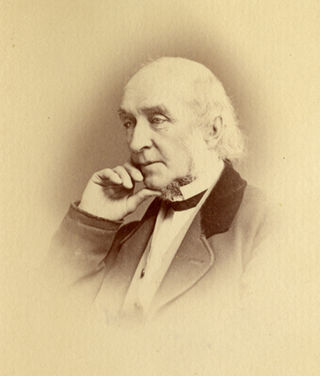
William Ellery Channing II was an American Transcendentalist poet, nephew and namesake of the Unitarian preacher Dr. William Ellery Channing. His uncle was usually known as "Dr. Channing", while the nephew was commonly called "Ellery Channing", in print. The younger Ellery Channing was thought brilliant but undisciplined by many of his contemporaries. Amos Bronson Alcott famously said of him in 1871, "Whim, thy name is Channing." Nevertheless, the Transcendentalists thought his poetry among the best of their group's literary products.

The Old Manse is a historic manse in Concord, Massachusetts, United States, notable for its literary associations. It is open to the public as a nonprofit museum owned and operated by the Trustees of Reservations. The house is located on Monument Street, with the Concord River just behind it. The property neighbors the North Bridge, a part of Minute Man National Historical Park.
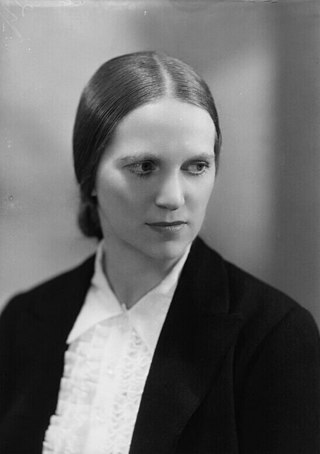
Ethel Edith Mannin was a popular British novelist and travel writer, political activist and socialist. She was born in London.

Nature writing is nonfiction or fiction prose about the natural environment. It often draws heavily from scientific information and facts while also incorporating philosophical reflection upon various aspects of nature. Works are frequently written in the first person and include personal observations.

Pilgrim at Tinker Creek is a 1974 nonfiction narrative book by American author Annie Dillard. Told from a first-person point of view, the book details Dillard's explorations near her home, and various contemplations on nature and life. The title refers to Tinker Creek, which is outside Roanoke in Virginia's Blue Ridge Mountains. Dillard began Pilgrim in the spring of 1973, using her personal journals as inspiration. Separated into four sections that signify each of the seasons, the narrative takes place over the period of one year.

The Wheeler-Minot Farmhouse, also known as the Thoreau Farm or the Henry David Thoreau Birthplace, is a historic house at 341 Virginia Road in Concord, Massachusetts, United States. It is significant as the birthplace of writer Henry David Thoreau. The house was listed on the National Register of Historic Places in 2004. It currently serves as a historic house museum and is open to the public.
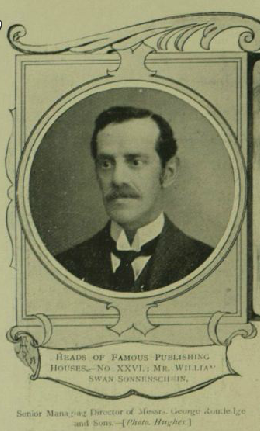
William Swan Sonnenschein, known from 1917 as William Swan Stallybrass, was a British publisher, editor and bibliographer. His publishing firm, Swan Sonnenschein, published scholarly works in the fields of philosophy and the social sciences. as well as general literature and periodicals. In 1902 he became the senior managing director of the British publishing firm George Routledge & Sons.
Paul Brooks (1909–1998) was a nature writer, book editor, and environmentalist.
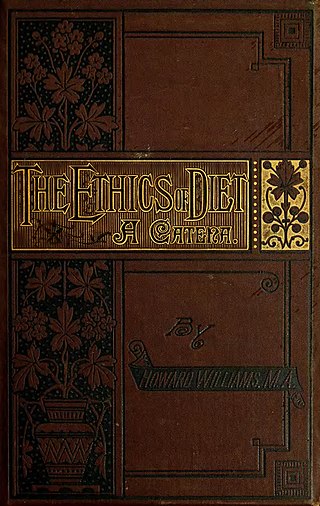
The Ethics of Diet: A Catena of Authorities Deprecatory of the Practice of Flesh-eating is an 1883 book by Howard Williams, on the history of vegetarianism. The book was influential on the development of the Victorian vegetarian movement.
The replaceability argument, or the logic of the larder, is a philosophical argument that has been used to reject vegetarianism. It holds that consuming nonhuman animal products is good for animals because if they were not consumed, fewer animals would be brought into existence. The argument has particularly been engaged with within the context of utilitarianism.
References
- ↑ Corporaal, Marguérite; Evert Jan, van Leeuwen (2010). The Literary Utopias of Cultural Communities, 1790-1910. Rodopi. p. 131. ISBN 978-9042029996.
- ↑ Ebbatson, Roger (2006). Heidegger's Bicycle: Interfering with Victorian Texts. Sussex Academic Press. p. 39. ISBN 978-1845191054.
- ↑ Salt, Henry Stephens. Richard Jefferies: A Study. London, Swan Sonnenschein, 1894. (pgs. 67, 91,105)
- ↑ Salt, Henry Stephens. Richard Jefferies: A Study. London, Swan Sonnenschein, 1894. (pg.109)
- 1 2 3 4 Looker, Samuel J., Richard Jefferies, Man of the Fields : a biography and letters. London: John Baker, 1965.(p.158-9).
- 1 2 Warren, C.H. "Richard Jefferies", Countrygoer magazine, Winter 1948 (pgs. 2-15)
- ↑ "Nonfiction Book Review: The Story of My Heart". Publishers Weekly . 22 September 2014. Retrieved 4 October 2016.
Jefferies, as Brooke notes, had his share of admirers and intense critics—Rachel Carson purportedly kept two copies of the book at her bedside; others deemed it "utterly chaotic" and "barely comprehensible."